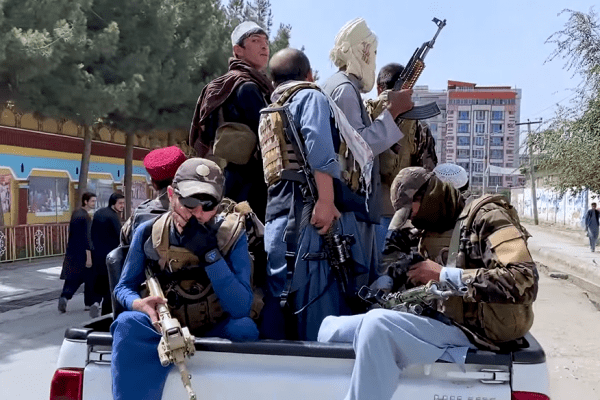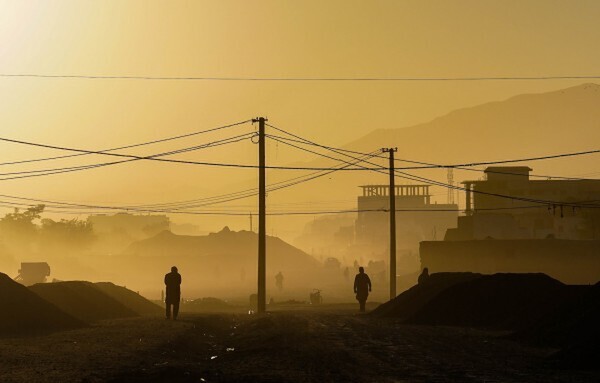Scholar-advocate Vinod Bal explores the circumstances for LGBT+ Afghans under the Taliban regime and calls for a rainbow refugee quota for New Zealand.
On 15 August 2021, the Taliban re-entered Kabul after a 20-year hiatus, seizing control of the country.
Many Afghans were worried about what the re-emergence of the Taliban regime would mean for them, and rightfully so: the human rights abuses of the Taliban are well canvassed.
There was one particular group that held a well-founded fear about life under the returned Taliban regime: Afghanistan’s LGBT+ community.
Armed transport in Taliban-controlled Kabul, August 17 2021. Image: Wikimedia Commons
The ills committed against them under the prior Taliban regime are well-remembered: summary execution and torture was not rare, and a climate of fear, ubiquitous. After this first regime fell, same-sex intimacy was still criminalised. In fact, in 2018, the elected government of President Ashraf Ghani passed a law that criminalised same-sex relations.
There was, and is, no reprieve.
In 2020, while still engaging in insurgency, the Taliban’s Ministry of Vice and Virtue issued a manual that noted that religious leaders will prohibit same-sex relations, and that “strong allegations” of homosexuality will be referred to the Ministry’s District Manager for decision and punishment.
Indeed, there has been a manifestation of this sentiment with the Taliban’s takeover of Afghanistan. Earlier this year, a Taliban “judge” said that the only appropriate punishment for homosexuality is death: “[f]or homosexuals, there can only be two punishments: either stoning, or he must stand behind a wall that will fall down on him. The wall must be 2.5 to 3 metres high.” The judge’s pronouncement only affirmed what LGBT+ Afghans already knew: that they would not be safe under a Taliban regime, instead, they would be targets of the Taliban state.
Being made targets of the Taliban state manifests in a variety of ways, but one way is through the commission of atrocity crimes. Torture, summary execution, threats from family and neighbours, forced disappearance, and sexual violence against LGBT+ Afghans is commonplace. Indeed, the Taliban has been increasingly innovative in the way that they entrap LGBT+ Afghans with some members of the community saying that the Taliban has infiltrated LGBT+ groups and online networks.
A climate of fear is growing in the community. Gay Afghan men have been reporting that the Taliban’s persecution of LGBT+ Afghans has been increasing in hostility, ever since Monkeypox was detected in Europe: “[w]hen they detain homosexuals, [they tell the public it’s to] prevent the spread of monkeypox,” a Kabul-based gay man told LGBT+ media outlet Pink News. The Taliban has been using this virus as a scapegoat to affirm their hate even more.
A climate of fear has been growing for LGBT+ Afghans following the Taliban's takeover of Kabul in August 2021. Photo by Mohammad Rahmani on Unsplash
Considering these set of circumstances, it is not surprising that many LGBT+ Afghans are fleeing home in pursuit of a life where they can be their authentic selves without fear.
However, for many LGBT+ Afghans, the trouble associated with fleeing, is actually being able to flee in the first place.
For example, the Taliban has prohibited women from travelling without male relatives. This means that lesbians and bisexual women are not able to escape on their own, especially considering that their families are not likely to know about their sexuality, nor support their efforts to flee. Further, for gender non-conforming individuals, who are visibly seen as such, the routine checkpoints on public roads prove to be all-too-high of an impediment.
For those that do flee Afghanistan, their options still limit their ability to be themselves. Most of the countries that border Afghanistan, including Iran, Pakistan, Turkmenistan and Uzbekistan also criminalise same-sex relations.
In fact, in Iran, same-sex intimacy can be punished by death.
While in refugee camps, in some of these countries, LGBT+ Afghans have reported dire circumstances. One gay LGBT+ Afghan, Binyamin (not his real name), who is in a refugee camp, has reported attempted rape against him. He says of his fellow countrymen who fled with him, “[t]hey don’t consider us human… but as slaves or sexual objects.” Many other LGBT+ Afghans have reported sexual violence, verbal abuse, and physical violence against them while in refugee camps. Because the refugee camps they live in are in countries that criminalise homosexuality, they have no authority to complain to, and they have no recourse to justice.
While they fled Afghanistan to escape the Taliban, they face a new form of persecution. LGBT+ refugees generally, and these LGBT+ Afghan refugees face double jeopardy: their sexuality and/or gender identity makes them a target inside a refugee camp.
Rainbow Railroad, a Canadian charity, has noted that they have more than 3,300 LGBT+ Afghan refugees on their waiting list for relocation to a new country. However, thus far, only 80 people have been relocated to Ireland, the United Kingdom and Canada.
New Zealand has accepted a handful of LGBT+ Afghans. This is not good enough, and LGBT+ Afghans know this. Sohail, a gay man in Kabul who was burned with boiling water and interrogated by the Taliban has said that he is “shocked” by the apathy of the international (LGBT+) community.
We owe it to people like Sohail, people who have been made targets of their state because of who they are, to provide safe haven. This is especially the case considering that the New Zealand government has said that it will take a “leadership role” on international human rights advocacy related to “sexual orientation and gender identity.” Accepting only a handful of LGBT+ Afghan refugees? Hardly a leadership role.
New Zealand needs to give more attention to the urgent needs of LGBT+ Afghan refugees. New Zealand can be their safe haven. New Zealand needs a permanent commitment to LGBT+ refugees, in the form of a rainbow refugee quota, the like of which, has been in the works by people like Murdoch Stephens and organisations like Rainbow Path.
New Zealand can do so much more. We should do so much more. It’s the right thing to do, and god knows that we will be on the wrong side of history if we don’t.
- Vinod Bal
This article is republished under Creative Commons and from the Asia Media Centre.

